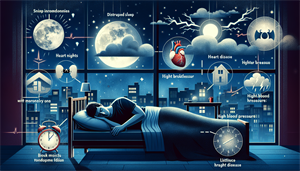
Does Snoring Mean Poor Sleep Quality?
Have you ever been jarred awake by the sound of your own snoring? Or perhaps you’ve been the victim of a nudge from a disgruntled bed partner, begging you to stop the cacophony.
Snoring can be a nuisance and a source of embarrassment, but it can also be a sign of something more serious.
In this blog post, you will discover the hidden implications of snoring on sleep quality and overall health, and how to navigate the path towards quieter nights and healthier days. But first, let’s answer the question: does snoring mean poor sleep quality?
Key Takeaways
Snoring is not just a nuisance but can be an indicator of potential health issues like obstructive sleep apnea or cardiovascular conditions, which can significantly impair sleep quality for the snorer and their bed partner.
Lifestyle factors such as anatomy, body weight, alcohol consumption, and sleep position all play roles in the development and severity of snoring, with remedies ranging from positional adjustments to professional medical intervention.
Chronic snoring can lead to serious consequences like cognitive impairment, heightened risk of chronic health problems, and can affect daily productivity and mental well-being, necessitating accurate diagnosis and treatment.
Unraveling the Link Between Snoring and Sleep Quality
Snoring extends beyond being a mere nighttime nuisance. It can disrupt sleep quality, leading to potential health issues and daily life consequences for both the snorer and their bed partner. Prolonged snoring may indicate an underlying sleep disorder and can disrupt the individual’s own quality of sleep.
Moreover, the physical and mental well-being of the non-snoring bed partner might suffer, such as moodiness, exhaustion, and a lack of concentration during the day due to the snoring, which can also pose health risks.
Snoring, particularly if it indicates sleep disorders such as obstructive sleep apnea, may be connected to potential health issues. Insufficient sleep due to snoring may result in: Fatigue, irritability, reduced productivity, waking up in a negative mood for both the individual who snores and their non-snoring partner, making it difficult to fall asleep and stay asleep.
The Sound of Trouble: Loud Snoring and Its Implications
Loud snoring is more than a mere annoyance. It may be a sign of a more serious condition, such as obstructive sleep apnea (OSA), a disorder marked by loud snoring followed by intervals of silence when breathing ceases or nearly ceases during sleep. These disruptions can notably diminish the quality of sleep, resulting in excessive daytime fatigue.
It becomes vital to seek medical advice if snoring is coupled with breathing interruptions, excessive daytime sleepiness, or gasping or choking during sleep. These symptoms may indicate a more severe condition like OSA, which demands medical intervention.
OSA is linked to a range of medical complications, such as an increased risk of heart conditions, high blood pressure, stroke, and diabetes.
Breathing Pauses: The Hidden Culprit of Restless Sleep
Breathing pauses during sleep, characteristic of sleep apnea, have a significant impact on sleep quality. They cause interruptions in the sleep cycle and prevent the individual from achieving restful sleep. This can lead to fragmented sleep, insufficient oxygen, and excessive daytime fatigue.
Although not all individuals who snore have sleep apnea, symptoms such as daytime drowsiness, morning headaches, or sudden gasping or choking during sleep could suggest the presence of obstructive sleep apnea (OSA). When sleep apnea is suspected, recognizing the symptoms is crucial.


